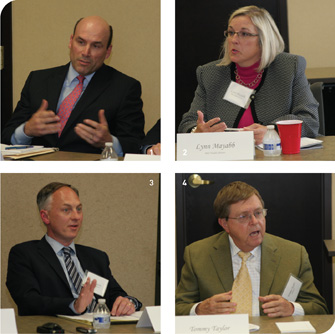
1. Bill Koehler said investors would do well to turn off the 24/7 TV channels and align with stocks issued by companies that show promise for strong growth. | 2. More investors could benefit from conversations with advisers about the real risks associated with owning bonds, said Lynn Mayabb. 3. Without a stock market consistently achieving new highs, said Ken Eaton, there would be no point in investing in equities. | 4. Tommy Taylor’s experience with reluctant investors includes a member of his own family—his farm-owning father.
The Fear Factor
The other major investment vehicle for many, stock ownership, has produced two kinds of investors, wealth managers say: Those who fear major corrections, and those who are new enough to equities to ignore the inevitable downside of any long-term run-up.
Despite this year’s surge in the Dow Jones Industrial Average, “we’re working through a fear bubble, in our view,” said Bill Koehler, a prolonged reaction by investors burned in what he called the “greed bubble” that burst in 2000 and again in 2008. “As long as we’re working our way through that fear bubble, we’re going to have questions like ‘What keeps you up at night?’
Koehler said that in conversations with clients—aside from telling them to turn off the TV—he asks what gets them up in the morning. “Working with a trusted adviser and being able to hook yourself up to the productive capacity of the United States” would serve investors well, he said.
“I think people are still fearful of stocks,” said Tracy VanDyke. “They’re wondering if this run-up is real, and yet they don’t know whether they can turn to bonds because the interest rates are awful, so they’re sitting there saying ‘I have no place to hide.’ ” But again, she noted, financial advisers can help them manage the emotion, not unlike psychiatrists. “I don’t know how many times you all felt like you’ve needed a couch in your office, but that’s what I think a lot of the job is.”
“My Dad is 94 years old,” said Tommy Taylor of Polsinelli, P.C., “and I asked him couple of years ago why he never invested in the stock market. His answer was simple: ‘I don’t understand it.’ An old farm boy, he bought cattle, he bought farmland, and he sat on it. He didn’t realize he was into equities, but that’s what he was into.”
Bob Rippy saw the potential for future gains in corporate America’s response to the recession and slow-growth recovery. Many individuals have sharply reduced personal debt over the past five years, and “corporations have done the same thing—cut the heck out of debt,” Rippy said. “Balance sheets have never, ever been as strong as they are now, cash is absolutely rampant in these companies.”
That has produced a swelling of stock buybacks, increased earnings per share and led to more companies increasing or re-instating dividends. But it’s important to note he said, that “the stock market is not really all that high in historical context.” Based on this year’s trading, the S&P 500 is trading about 15 times earnings, about 18 times earnings since Jan. 1, levels far below what were seen in more speculative eras.
What will it take to break that cash dam and send that money pouring back into business expansion? “The first thing you have to do is allow repatriation of money overseas” by lowering corporate tax rates, Rippy said. “There are billions and billions and billions of dollars sitting overseas.”
KC Mathews also saw, in reading the numerical tea leaves, the potential for higher gains. In 2000, the S&P stood at 1,527, representing $54 worth of earnings. Today, that same index yields $107 worth of earnings, and potentially $115 next year. But the index is still stuck near 1,700, he noted. “The market is a leading indicator,” Mathews said, “so not only has it kept up, it gives us some insight into future economic growth. We can see 2–3 percent economic growth in 2014, and the stock market will tell you yes, because that’s where we are with earnings growth.”
As for regular news reports on the 24/7 channels questioning whether any given day’s “record” high is sustainable, Ken Eaton said “the fact is that if we don’t keep reaching new highs, you better not be investing in the market, because if all you’re going to do is lose money, it doesn’t make sense to be there.”